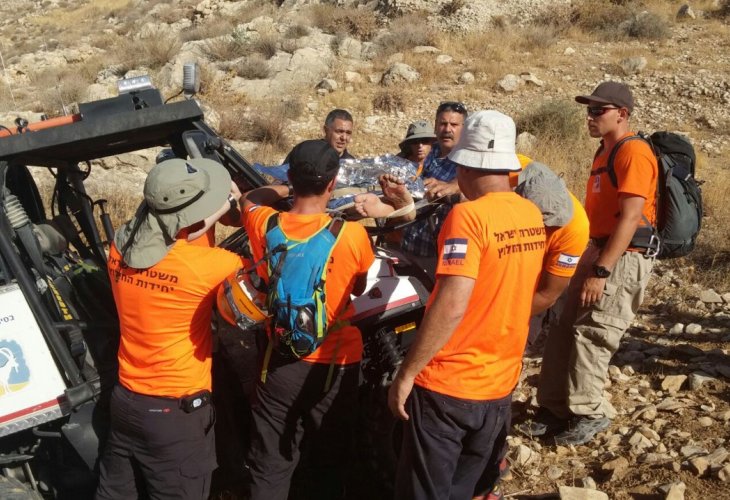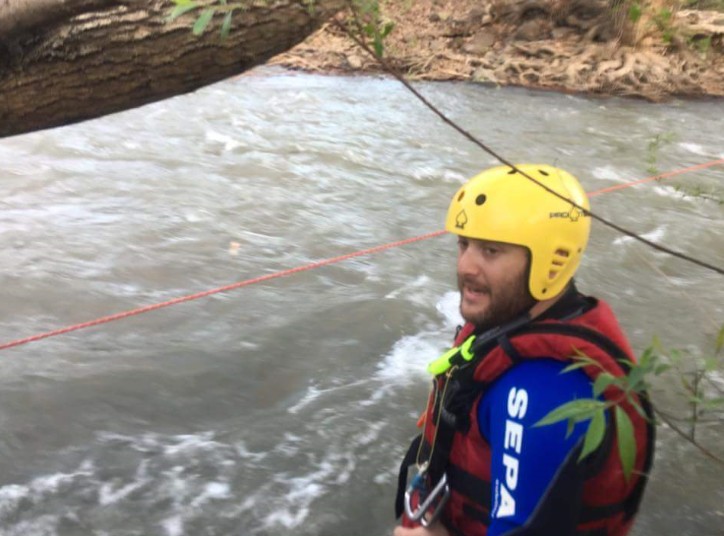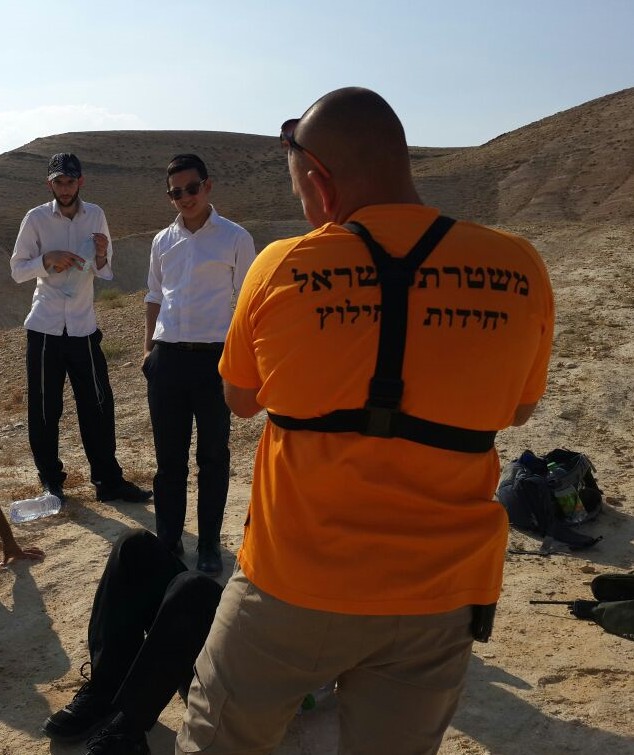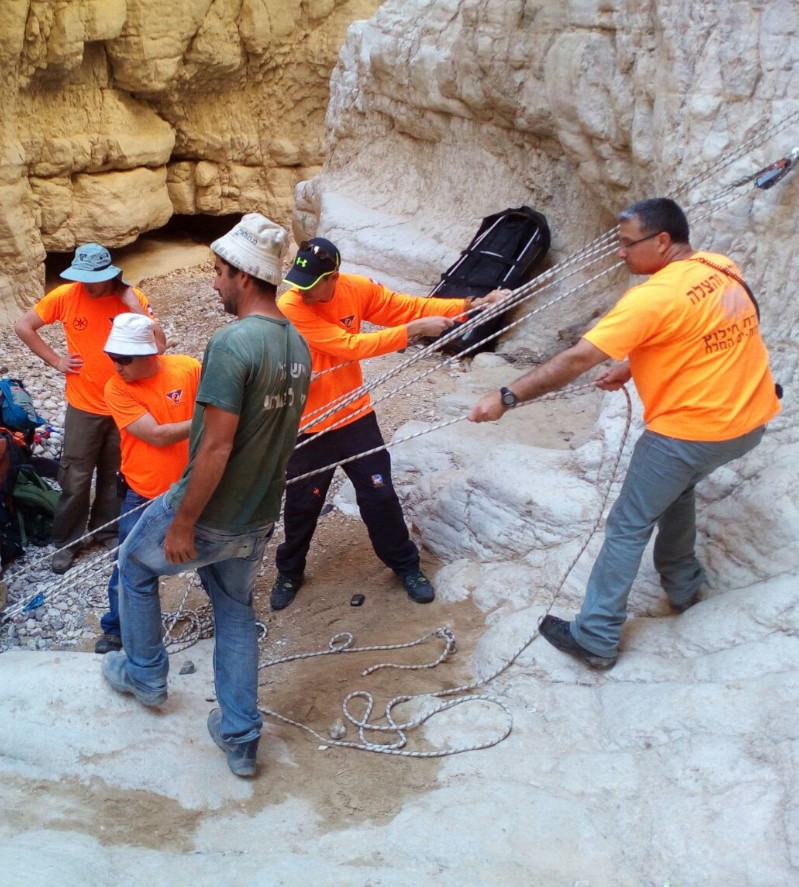Nitai Reish: "No Sweeter Feeling than Saving Lives, but I Hope It Happens Less"
Nitai Reish, a volunteer with the Megilot Dead Sea Rescue Unit, finds himself frequently called out these days for rescues. Hikers, often young men, embark on trails without adequate preparation. In an engaging conversation, Reish shares insights into their rescue missions and pleads with hikers: "Take care of yourselves, we want everyone to return safely."

It was a year ago. Nitai Reish, a volunteer with the Megilot Dead Sea Rescue Unit, received an urgent call about forty young men who went hiking in the Og Stream and didn't know how to return.
"It was late at night," he recalls, "but of course, I didn’t hesitate and rushed to the field. The rescue wasn’t particularly complex; once we understood from the frightened guys where they entered the stream, how long they walked, and the direction they headed, it was relatively easy to reach them. However, the biggest surprise came when we met them. It turned out to be about 40 young men who set out on a hike at 6 PM, even though the sun sets by 7 PM, and yet none of them brought proper night equipment. They didn’t even have a flashlight, so it’s no wonder they lost their way."
Those joining Reish in disbelief about how the group set out might need to know this was not the first or the last case. "There are times when we are called for a rescue and discover that hikers didn’t consider bringing more than a small bottle of water, people go on hikes in dress shoes, or without wearing a sun hat. We’ve encountered situations where hikers couldn’t convey how many people were in their group, and even organizers didn’t have lists. In such cases, we need to do thorough work and question each person about where they sat on the bus, who sat next to them, in front, and behind, to avoid leaving anyone missing."
The seasons aren’t always clear to hikers either. "Although I volunteer in the Megilot Dead Sea Rescue Unit, our work isn't only during winter when there are many trips to the Judean Desert but also in the summer. Many people choose to hike in this area, despite it being less suitable during that time of year. Sadly, not everyone is aware that hiking in the Judean Desert during the summer can be very dangerous."
Between Sky and Earth
In most cases, Reish says the rescue is relatively straightforward, "once we know where the hikers are, we can easily reach them and help them out. Of course, we need to bring jeeps to the area, provide first aid equipment, and scan the entire region afterward to ensure no hiker is left behind, but as I said, these rescues are relatively simple."
Tell us about more complex rescues!
"A complex rescue happened about three years ago when three young men were rappelling in Nahal Chatzatzon. It has the highest rappelling waterfall in the country at 120 meters. The first two rappelled successfully, but the last one got stuck halfway when his tzitzit got caught in the rappelling equipment. He was left hanging between sky and earth at a height of 80 meters for eight hours.
 Nitai Reish
Nitai Reish"It was terrifying," Reish recalls. "We had five rescue units at the site, about 50 volunteers, and a helicopter. The rescue was very complex, lasting from 5 PM until 8 AM, with no breaks as we all worked to save him. I remember hovering above him in the helicopter, thinking he might not survive."
Why? Were you afraid he'd fall?
"No, in this case, there was no risk of falling; he was secured with the rappelling gear. The most severe issue was the high pressure from the harness around his legs, creating a tourniquet effect that stopped blood flow to the arteries. Being in that position for eight hours could cause immediate gangrene in both legs and real life-threatening danger. In the end, we managed to rescue him miraculously, and he was discharged from the hospital two days later. It truly was a miracle."
High Cost, Huge Investment
But it's not just young men who are rescued by the units. "While it's true that we mainly rescue young men," Reish acknowledges, "there isn’t a month where we aren’t called to rescue families who have entered trails unsuitable for them and found themselves unable to continue. We even had a family take a baby stroller into one of the most challenging trails in the country. It was absurd. Even experienced hikers struggle there, and they tried it with a stroller!"
However, Reish emphasizes that most families generally choose less challenging, simpler hikes, and usually, nature reserve rangers resolve the issue without needing rescue units.

And who bears the cost of these rescues?
"It's indeed a very high cost. We receive a meager budget from the state and mainly rely on donations. A large portion of our donations comes from the 'Israelife Fund,' which brings together emergency volunteer organizations in the country, including the rescue units. The fund helps us purchase life-saving equipment and other means. Recently, a conference in the Knesset promised us additional funding from MK Uri Maklev of United Torah Judaism. I truly hope this will help."
What about those rescued? Aren't they required to pay?
"In cases of negligence, the Israel Police opens a case and sometimes imposes a fine, and the Nature and Parks Authority may sue for law violation, but as rescuers, we don't charge those we rescue."
"Amazing to Feel You're Saving Lives"
Nitai Reish has been volunteering with the rescue unit for almost a decade. During this time, he must be available 24 hours a day, 365 days a year. "And it’s really not easy," he admits. "Certainly not when you sit at a Shabbat dinner with your fiancée and suddenly receive an urgent call, or during the small hours of the night, and even more so when it happens on Yom Kippur."
On Yom Kippur?!
"Yes, about every two years, we are called on Yom Kippur, amid the fast and prayers, because even then, people hike. It's not easy for any of us, but we know it's our duty and mission, so we get up and go. We strive to do what’s necessary."
He reflects for a moment and adds: "I think it's joyful to know you can be on the helping side and not the side being helped. Although not every time we go on a mission are we wrapped in a halo of saving lives; we just do what's required. But ultimately, knowing that you’ve saved lives is amazing."

As Reish points out, there are many rescues each year, but some are unforgettable. Such was the time his rescue unit saved two brothers who went swimming with another friend in the Darga Stream in the Judean Desert. They entered when the water was nearly freezing, suffering severe hypothermia. The friend called for rescue when the two brothers were near death. One was rescued in critical condition but miraculously recovered, while the other died in the stream.
"We can never forget this story," Reish recalls with tears. "I remember how 30 days after the son’s death, we were invited to a thanksgiving meal by the parents. It was incredibly moving. We saw this terrible tragedy on one side and the miraculous rescue on the other, knowing it was just seconds between life and death for this young man. It's a case you can't forget."
Take Responsibility
Reish takes this opportunity to call out to the public: "We aren't telling people not to hike but the opposite – go out, hike, and enjoy, but do it safely."
In his words, there are several simple rules for a safe hike:
- First and foremost, know the destination and the trail’s difficulty. Families shouldn’t go on a trail like Nahal Darga, which is very challenging, while two young guys might do it easily and enjoyably.
- After deciding on a trail, prepare with water, a hat, proper shoes, and suitable clothing for summer. You can't wear black clothes in the summer; it's very dangerous and can cause heatstroke. A black hat isn't recommended either; it absorbs a lot of heat and warms the head.
- It’s very important to inform someone at home where you’re going and when you plan to check in. Families often panic when their son hasn’t returned by 8 PM, while he planned to leave the trail at 12 AM.
- Lastly, if you get into trouble: call 100 (Israel Police hotline) or 1221 (United Hatzalah hotline). Both centers know how to alert us. Don’t hesitate for a moment. Sometimes it can save lives.

